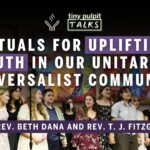I’m not dying today! | Faith & Film | Rev. Beth Dana | 06.16.24

Sermon Transcript
Monumental, triumphant, or breakthrough moments don’t just happen every day, but I trust that each of us has experienced at least one in our life thus far. It could be a professional accomplishment like landing a dream job or being recognized for your work. It could be a personal milestone like coming of age, or getting married, or becoming a parent. It could be some long sought after experience, like a trip to someplace magical or a concert by your favorite musician or some other thing on your bucket list. It could also be some kind of emotional breakthrough that results in deeper self understanding or a spiritual epiphany that leaves you with a greater sense of meaning and connectedness. You’re filled with hope, feeling satisfied or accomplished, perhaps even elated. And then sometimes, the next day you wake up and think, so what’s next? Is this it? I thought I’d feel different. The next day or in the next few days, reality sets in and you realize, oh, this is not all I thought it would be.
This is what happens to Joe Gardner, the main character of this week’s Faith and Film pick, Soul. Joe is a middle school music teacher who dreams of making it big as a jazz pianist. One day he gets a call from a former student inviting him to play a gig with jazz legend Dorothea Williams. He jumps at the opportunity, hoping that this might be his big break, the experience that he needs to go from writing his name on the chalkboard at school to seeing his name in bright lights on the marquee. The audition goes beautifully, and as he’s leaving the club walking on air and filled with hope, he falls into an open manhole and dies.
All of a sudden, he finds himself on a moving walkway, which he discovers is taking him to the great beyond. His immediate reaction. It’s to take off back down the walkway, dodging other souls as he tries to run back to his body and back to his life. “I am not dying today, not when my life just started,” he protests. And this plea is so telling. He thinks his life just started, as if everything he’s done thus far means nothing. Don’t fall into the same trap that Joe did. Now he somehow succeeds in escaping the great beyond, defying all the structures and lands in the other part of the afterlife called the great before, a place where new souls find their personalities and their spark with the help of mentors who have already lived life on earth. It’s there that Joe meets 22, now who is a disembodied soul who’s been hanging around the great before for a very long time, so long that they’re currently on soul number 100 billion something or other, and this is soul number 22.
Now, all of 22’s many famous historical figure mentors have failed to prepare her for being born because of her fierce resistance. 22 has no interest in life on earth, and she seems perfectly happy dwelling in the limbo of the great before. “You can’t crush a soul here,” she says. “That’s what Earth is for.” Joe is obsessed with making it big as a musician and is desperate to return to earth to make this dream come true. 22 hasn’t found her spark yet, and so she resists traveling to earth and actually living because she thinks that life will be meaningless if she doesn’t have one glorious purpose. Both are being held back because they don’t understand what life is really about. Do you believe that each person has one true purpose in life? Many people do. Joe certainly thinks so.
Not only is jazz piano Joe’s passion, but he believes it is his purpose, his reason for living. When he is playing, he is in the zone, which the movie describes as this flood of feeling that envelops him and becomes an obsession, such that the rest of his life, his family, his teaching and all the rest mean very little to him. He becomes anxious, disconnected from his life, and so wrapped up in it that he doesn’t look where he’s walking, and whoops, through the manhole. He goes. Some people believe that a person’s purpose comes from God, that it is assigned or given to them and they just have to discover it. The film’s director, Pete Docter, is committed to convincing us otherwise. His breakthrough moment was working on the wildly popular Pixar film Inside Out the film received numerous accolades, and it was the moment when his career really took off, but then he experienced that feeling of let down and asked himself what’s next.
He reflected back on this time saying, “I realize that as wonderful as these projects are, there’s more to living than a singular passion.” For centuries, philosophers have asked whether we need a why in order to live. Angelus Silesius, a 17th century priest and poet wrote, “The rose is without why? It blooms simply because it blooms. It pays no attention to itself, nor does it ask whether anyone sees it.” His conclusion is that when we ask why and for what, we’re looking for an answer that cannot be given. But when we open ourselves to a broader exploration and an openness to life without one big why, we’re better able to recognize the blooming roses all around us. Questions of why and purpose, what are we here for, and what are we supposed to do are the beginning of religion. People often look to religion for answers to these questions. For us as unitarian universalists, and for many other religious people as well, there are no easy answers. There’s no one answer even for each person, but that doesn’t mean that life is without meaning or purpose.
Over the past year, I’ve worked with a number of young people in our church who have explored these exact kinds of questions, whether it was in homilies here for Youth Sunday or in their spiritual reflections that are part of the culmination of their ninth grade coming of age year. They all ask these questions, and they all came to a similar conclusion. They said, “There’s no big why or purpose for our lives. We just need to live and embrace the many, many small moments that make up our lives. When we dwell too much on the big why, we’re more easily thrown off by curve balls, more likely to,” as one of them talked about “slip on banana peels or be derailed by personal and world crises, and we risk falling into those open manholes. But if we’re actually paying attention to what’s happening around us, the little seemingly mundane things, our lives are more grounded in reality and we’re happier.”
Never doubt the wisdom of young people. Grown adults like Joe Gardner would do well to listen to him or to them. Toward the end of the movie, after some zany adventures and literal out of body experiences, Joe returns to earth to play the show with Dorothea Williams. Their performance is a great success and the crowd roars with applause. It’s a triumphant moment, one that Joe believes signals the real beginning of his life. But instead of feeling fulfilled and purposeful, Joe feels empty. Something’s missing. He thought he’d feel different, but he doesn’t. He confesses this to Dorothea who responds with a story. She says, “I heard this story about a fish. He swims up to an older fish and says, ‘I’m trying to find this thing they call the ocean.’ ‘The ocean?” says the older fish. ‘That’s what you’re in right now.’ ‘This?’ says the young fish. ‘This is water. What I want is the ocean.'”
Now, that’s a parable for all times, isn’t it? Immerse yourself in the water because you’ll never know the whole ocean. It’s a mystery that transcends our ability to fully experience, and yet is closer than we often realize, just like how some of us experience God, right? Joe had mistaken his work and his dream of making it big as a musician for his spark, his identity, and his purpose. He was looking for the ocean, but he was in the water all along. I know I’ve made this mistake in my life at times looking for the big aha or the big hurrah and missing what was right in front of me. I’m sure at least some of you know what I’m talking about. Yes.
Joe’s mentee, 22, does eventually find her spark and begins life on earth, but Joe continues to puzzle over what it was that finally got her earth pass, which brings us to the scene in which he finds that collection of objects in his suit pocket, objects that 22 had gathered during their adventures on earth together, during which 22 occupied Joe’s body and Joe occupied the body of a cat, out of body experiences. Joe pulls the objects out of his pocket and lines them up on his piano, a whirly gig from the maple tree that spiraled down into her hand, a crust from her first time ever tasting pizza, the remainder of a bagel that she had torn and given to a busker after being swept up in his music, a lollipop from the barbershop, a spool of thread from Joe’s mother’s tailor shop, and a used metro card.
This lineup of unremarkable objects stirs a series of memories from Joe’s own life, listening to jazz records with his dad when he was a kid, biking in the warm summer sun, watching fireworks on the 4th of July, eating pecan pie alone in a diner, his first day as a music teacher, playing piano for his aging dad, feeling ocean waves wash over his bare feet while watching the sunset with his mom, and riding an elevated train at sunset. Each of these is a moment in time, a moment of his life, but a truly beautiful moment that made life worth living. Notice that these moments did not include triumphant monumental moments such as playing with Dorothea Williams. They were moments of, in Joe Gardner’s words, regular old living. It was only then that he realized souls get their earth pass when they find the spark of life, when they are ready to live in this messy world and to be a part of it, when they have what they need to live with soul. Unitarian Universalist minister Barbara Rohde once wrote, “The central question of religion is not whether one lives forever, but whether one lives.”
I think of this as embracing the opportunity to live in this world and to live it fully, to take one’s place in the interdependent web of existence and to recognize your connection to all things and beings. When you’re able to do that, you’re really living, not just existing, but living, like Anna Quindlen talks about in the reading. So if you were to collect a few objects in your pocket that represent the unremarkable yet beautiful moments of your life this week, I wonder what your collection would include. Perhaps the remnant of something that you experienced for the first time, an object that symbolizes a connection you made with another person. Something that represents pure and simple joy like a lollipop, a flower that caught your eye, maybe a rock, a shell, or a drawing given to you by a child. Think about it.
I gave it some thought this week, as you saw in the story, and that first object that came to mind was what I shared, this piece of pink yarn that I found on my kitchen floor, which is an unremarkable object, but it represents time spent with my daughter and a connection I made with a young person here at church. One of the best spiritual practices that I know of for reflecting on these things is the examine, a practice that comes from the Ignatian spiritual tradition. Saint Ignatius of Loyola was a Spanish priest and theologian in the 16th century and the founder of the Jesuit Order. The examine is a daily practice of examination or a mindful review of your day in which you reflect on your awareness of the sacred and everyday moments. You ask questions like, where have I been? Who was with me? What was I feeling? What were the sights and sounds and smells? When did I feel most alive and most drained? When did I feel like I belong or don’t belong?
The experiences that arise from this reflection will likely point toward what it means for you to live with soul in this world. When asked what he’s going to do and how he’s going to spend his life, Joe replies, “I’m not sure, but I do know I’m going to live every minute of it.” So remember, life begins not just when we make it big, but when we are ready to immerse ourselves in the many small things, moments that collectively make a life worth living. So go out and live friends, savor the experience, watch out for those open manholes, drink in the nourishing water of this world, and swim in it knowing that you are part of a much larger ocean than you will ever fully know. May it ever be so, and amen.







